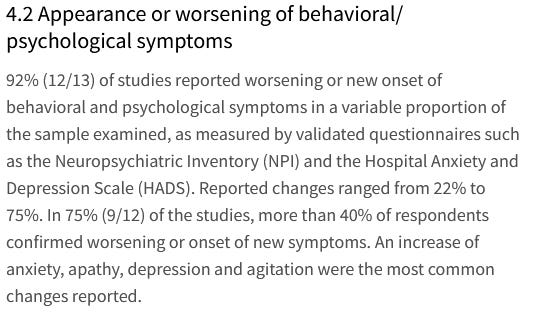LANCET|The effect of COVID-19 isolation measures on the health of people with dementia
Revelatory UK based study from 2021.
Rapid review
This rapid review seeks to answer the following question:
What is the relationship between COVID-19 isolation measures and the cognitive and psychological symptoms and level of independence of people with dementia living in the community and in care homes?
NB: Study date range from March 23rd 2020 up until 27th February 2021.
Findings
‘‘COVID-19 isolation measures have damaged the cognitive and mental health of people with dementia across the world.’’
Studies involving people with dementia living in the community
‘‘Specialist dementia consultations were postponed or suspended and day centers, home services and therapeutic and support activities closed or curtailed in many countries.’’
‘‘These are all essential services to help people with dementia maintain their health, well-being and quality of life.’’
‘‘For those living in care homes, the experience of going through lockdown was even harder…
..since the measures in residential facilities were considerably more restrictive than for those living in the community and lasted longer.’’
Results
61% (8/13) of studies reported decline in cognition.
Reported worsening in cognition ranged 12–80% across studies, with 75% (6/8) of them describing decline in > 50% of respondents.
Concentration, memory, orientation and communication were the cognitive domains most named as affected.
92% (12/13) of studies reported worsening or new onset of behavioral and psychological symptoms
In 75% (9/12) of the studies, more than 40% of respondents confirmed worsening or onset of new symptoms.
Changes in medication ranged from 7 to 27%..
..most commonly associated to the introduction of antipsychotics and benzodiazepines.
Studies involving people with dementia living in care homes
54% of residents experiencing worsening of memory.
Mean depression and anxiety scores increased in one study and mood deteriorated in 51%.
One study reported worsening of independence in ADL in 43% of the residents whose caregivers responded to the survey.
Conclusions
‘‘The majority of studies named depression, anxiety and apathy as the symptoms aggravated the most during lockdowns.’’
‘‘The majority of studies report cognitive decline in more than 50% of the sample examined.’’
‘‘While people with dementia deteriorate gradually over time…
…the decline reported by these studies occurred in an unusual short window of time (3,4 months)…
..Such accelerated rate of decline does not seem attributable to the typical natural course of dementia.’’
‘‘Decisions such as not referring care homes residents to hospitals and the blanket ban on visitors, conflicted with individual human rights and have likely contributed to both mortality and accelerated deterioration.’’
End of life medication prescribing
The one previous study on the prescription of antipsychotics for people with dementia in care homes during ‘the pandemic’ have already suggested that..
..their use increased significantly during the first months of 2020.’’
Rates in March, April, and May, 2020..
…were substantially higher than in the same months in 2018.’’
‘‘Our review is in line with this notion since increases in dosage or initiation of medication was found in up to 27% of people with dementia studied (most commonly antipsychotics and benzodiazepines). This may be indicative of generalized aggravation of dementia symptoms due to lockdown and impossibility of resorting to non-pharmacological management strategies due to the limitations imposed by anti-Covid measures.’’
End









